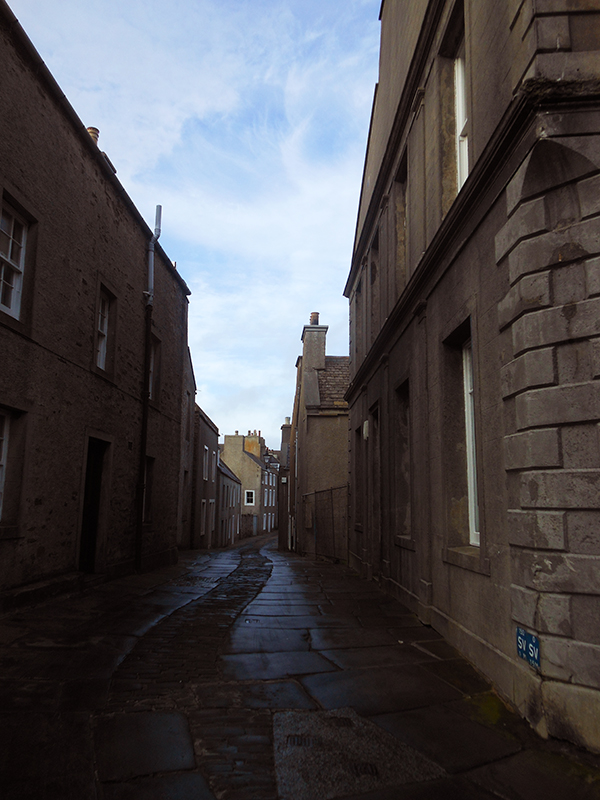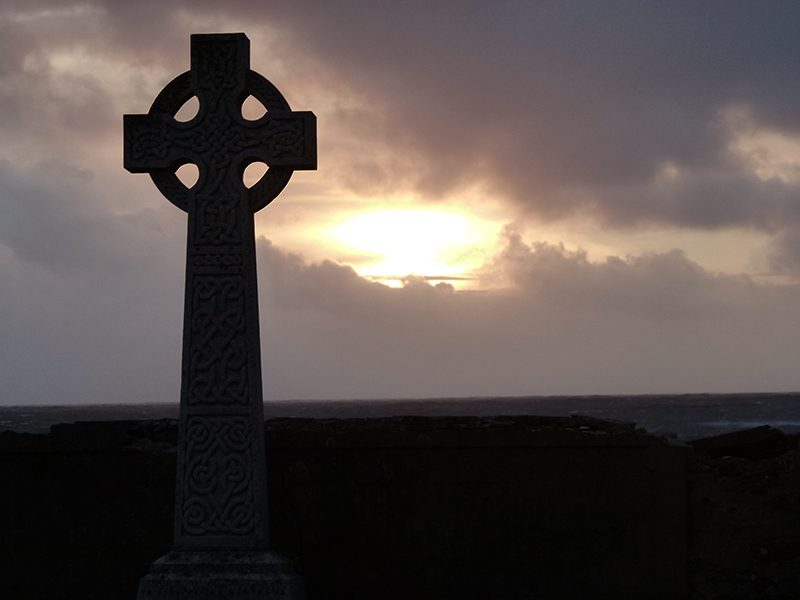A Work for Poets
To have carved on the days of our vanity
A sun
A ship
A star
A cornstalk
Also a few marks
From an ancient forgotten time
A child may read
That not far from the stone
A well might open for wayfarers
Here is a work for poets-
Carve the runes
Then be content with silence
(George Mackay Brown – ‘A Work for Poets’ – 1996)
George Mackay Brown was born on 17 October 1921 in Stromness and he died there, at the age of 74, on 13 April 1996, so today is the twentieth anniversary of the poet’s death. This page, I’ve written it in homage to the great Orcadian poet.
Carve the runes
then be content with silence…
These words, the final verses of ‘A Work for Poets’ are engraved in golden letters on GMB’s pink sandstone grave together with its four symbols: a sun, a ship, a star, a cornstalk…
Poetry is the golden key that opens GMB’s world… it illuminates every page of his work, whether it be a poem, a short story, a novel, a play, a children’s book or even the little chronicle he used to write every week in The Orcadian…
Two shelves in my library are devoted tp GMB’s books and books about GMB and among them several books of poetry: Fishermen with Ploughs, A Poem Cycle (The Hogarth Press 1974), Selected Poems ( The Hogarth Press 1977), The Collected Poems of George Mackay Brown published by John Murray in 2005)
Not forgetting Orkney Pictures & Poems, the very beautiful book written by GMB and illustrated by his friend Gunnie Moberg and published in 1996 with these very moving words :
“In Memory of George Mackay Brown –
You have inspired and touch us all.
Thank you.
St Magnus Day 1996.”
Travellers, another wonderful book of poestry is on my desk and it is one of my favourite books of poetry. In his poems GMB goes to the essence of things…
‘The Green Gate’, ‘Edwin Muir’, ‘Modigliani: The Little Peasant’, ‘Tolstoy’, ‘Norman MacCaig’, ‘Elegy for a Child’, ‘In Memoriam John L. Broom’, ‘Mhari’, ‘Stt Magnus Day 1992’, ‘Emigrants’, ‘ Haiku: for the Holy Places’, ‘A New House’, ‘Neighbours’, ‘The Finished House’, ‘The Mother’, ‘The Poet’s Year’, ‘Four Kinds of Poet’, ‘December Day, Hoy Sound’, ‘The Friend’, ‘The Solstice Stone’, ‘A Dream of Christmas’, ‘Summer and Winter’,’To the Tibetan Refugees’… all these titles and all the other ones ring a bell in my imaginary… it’s pure magic… it’s a gift of crystal-clear music and luminous images… a vision giving sense to life and hope to people in a world that can be desperately sad and cruel but so cheerful at the same time.
This book is one which travels with me everywhere since I’ve dowloaded it on my kindle, together with other titles by GMB 😉
Obituary: George Mackay Brown
Tomorrow is the feast day of St Magnus, the 12th-century martyr, patron saint of Orkney, and subject of the novel, Magnus, that the Orcadian poet and story-teller George Mackay Brown considered his best work. It would have given Brown quiet satisfaction that this was the day on which he would finally be laid to rest. Tomorrow afternoon, after a funeral mass in St Magnus’s Cathedral, Kirkwall, he will be buried in a kirkyard he loved from boyhood, looking out across the Atlantic, a mile from the seaport of Stromness where he was born 74 years ago and which he rarely left.
(Independent – Maggie Parham – Monday 15 April 1996)
When we went for the first time to Warbeth Cemetery, in 2003, not far from Stromness, it was not easy to find the place but it proved still more difficult to find GMB’s grave in this remote and solitary city of the dead. We had not much time that day, our last day in Orkney then, and I was in a particularly bad mood for being obliged to hurry up at the very moment when I wanted to take time…
Warbeth cemetery is divided into two different sections which are separated by a stone wall. There is the old graveyard and the new one which is much smaller presently but with plenty of space for new arrivals. Two “croque-morts” (undertakers) who were digging a grave when we arrived said to us that they did not know who was George Mackay Brown nor even if he was buried there and they soon left the cemetery. We were quite alone now, or so we thought, and it was getting colder and wintry.
There were so many graves to look at that my husband and I decided to search separately. I began to investigate the new part of the cemetery. After all, GMB had died only seven years before and he could be buried there. From time to time, I looked to the other side of the wall to see if my husband was luckier than me but each time I was disappointed. We would probably have given up our quest without the sudden appearance and unexpected help of a mysterious woman dressed all in black: “George Mackay Brown, the poet … oh I see” she said to my husband leading him directly to the grave while I was looking over the wall… then she vanished without warning! I would have run to thank her… we’re still grateful. Where did she come from and where did she go, we still wonder…just let me add something: knowing how sad I would be if we had to leave the place without finding GMB’s grave my husband had implored GMB repeating several times “Please George, help us !”…
Now the lovely statue dropping roses on Johanna Wilhelmina’s grave has become our landmark to find GMB’s grave. It is not far from it… such a lovely landmark…
GMB’s grave, so beautiful in its simplicity perfectly reflects the poet’s art and spirit and it stands amidst the magnificent landscape GMB loved so much with the Sound of Hoy and the island’s cliffs in the background. Here the poet rests amidst his people the names of which he liked to evoke each time he entered Warbeth Cemetery and very close to his beloved parents, John Brown, his father, the tailor and postman, and Mhairi Macky, his mother, a Gaelic speaker, born in Braal, a hamlet situated near Strathy, in Sutherland.
“This morning – as I write – is April 3, and the first wash of Spring has gone over the earth.
It is such a beautiful word – April – that even to utter it lightens the heart. It is a little poem in itself. It is full of delightful images. It has its own music – little trembling lamb-cries at the end of a field. The first daring lark lost in light.
You feel, in April, that you have come through another winter, a little bruised maybe, but unbowed.
Those chalices of light, the daffodils, having been sorely battered by the March storms, are shedding, one by one, their green covers and opening their vernal tapers.
Soon all of Orkney will be stitched by golden threads of daffodils, a lovely spread garment for Primavera …
The word ‘June’ is beautiful, too, of course, but like May it has a curtness that lacks the lyricism of ‘April’. In midsummer there is perhaps too much – what month-name devised by man could hope to contain the light and multitudinous beauties of the season? Best to be simple and brief, to hold the word to the nostrils like a plucked wild clover … Such enchantment, under the light that never leaves the sky – not at midnight even.”
To think GMB wrote these wonderful page just ten days before his death… it leaves me speechless ! What a man ! What a man !
Outside my window daffodils
Dance in the north wind…
(From St Magnus Day – 16 April 1992 – Travellers)
The daffodils have become emblematic of the poet. The above photo was taken by Janice in Stromness Museum in the poet’s corner. The museum is situated in front of the place where GMB lived up to the end of his life, on the first flat of a house situated at Mayburn Court where you can see a blue plaque.
Below is the view GMB could see every day, just across the street and close to the Museum. There is a bench where he used to sit to admire the view…
And below is the picturesque long paved street GMB used to walk along so often, on his way to the library or other favourite places in Stromness…
The first story through which I entered GMB’s world is a Christmas story entitled “The Last Island Boy”. It was first published in The Scotsman on 24 December 1985.
I immediately fell in love with this wonderful Christmas story. GMB wrote many of them and I had discovered ‘The Last Island Boy’ in The Best of Best Short Stories 1986-1995, an anthology of short stories published by Minerva and edited by Giles Gordon & David Hughes, a great book for the amateur of short stories. I will never forget the magic of the moment and I’m presently re-reading it, together with the short stories included in A Calendar of Love.
Here is a work for poets-
Carve the runes
Then be content with silence
Many thanks GMB…
We’ll go back to Stromness…
Mairiuna
















Such love and enthusiasm!
You, too, have written some beautiful words here, Mairiuna.
Thank you.
Iain.